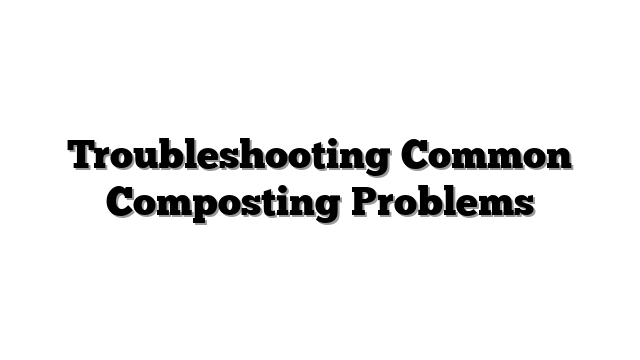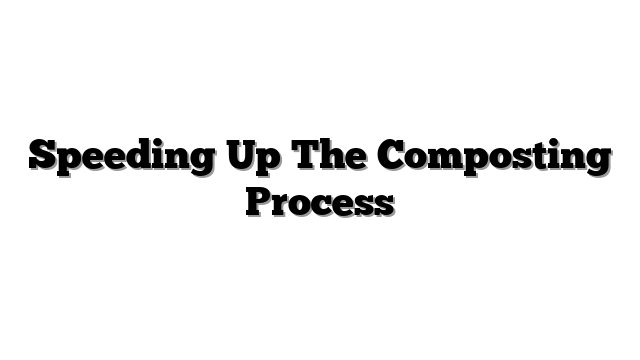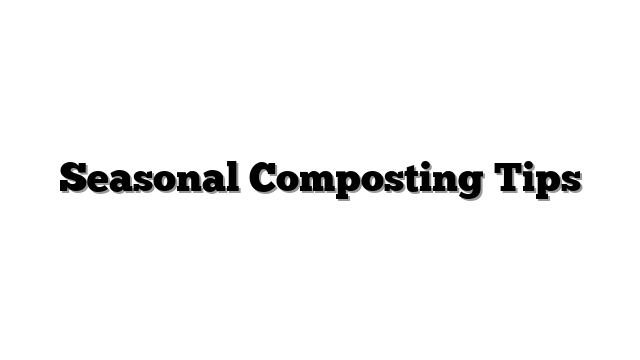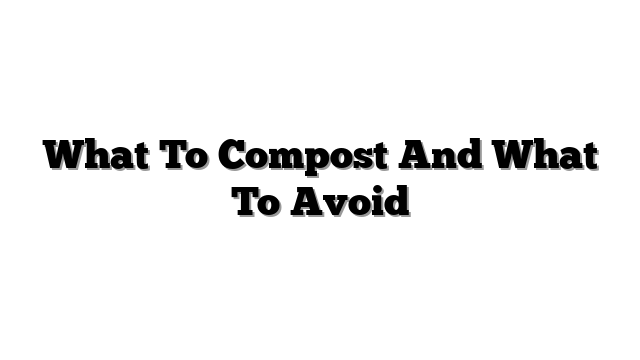Troubleshooting Common Composting Problems
Rich, dark compost. We all dream of it. It helps gardens grow strong. It makes soil healthy. Composting is good for the planet. We use kitchen scraps. We use garden waste. But sometimes our compost goes wrong. It smells bad. It stays cold. It gets too wet. It gets too dry. Pests move in. It takes forever. This makes us sad. But do not worry. We can fix these problems. This guide helps you. We will find the issues. We will fix them. You will make “black gold.” This guide covers common problems. We talk about bad smells. We talk about no heat. We talk about wrong moisture. We talk about pests. We talk about slow compost. You can make perfect compost. Even new composters can. We help nature. We help our gardens.
The Smelly Truth – Fixing Unpleasant Compost Odors
Your compost smells bad. Why does this happen? Foul smells are a problem. Rotten eggs smell bad. Ammonia smells bad. Decay smells bad. This means something is wrong. Air is often missing. We call this anaerobic. Anaerobic means without air. Or the mix is wrong. Too much green stuff. Not enough brown stuff.
Rotten smells mean no air. The pile is too wet. It is too tight. Materials are rotting. They are not composting. Ammonia smells mean too much nitrogen. Grass clippings have nitrogen. Food scraps have nitrogen. These are the “greens.” You need carbon too. Dry leaves have carbon. Cardboard has carbon. These are the “browns.” The balance is key.
Here is how to fix smells. Give your pile air. Turn it often. Use a pitchfork. Mix everything up well. This adds oxygen. Oxygen is needed. Add more brown stuff. Use dry leaves. Use shredded paper. Use straw. This fixes ammonia smell. It balances the greens. Manage the water. If it is too wet, add browns. Turning helps it dry.
One expert says: “Air is the compost’s best friend.” We need air for good smells. A recent study showed this. Piles with good air smell fresh. They smell like soil. This is what we want.
The Cold Case – Compost Pile Won’t Heat Up
Your compost pile is cold. It is not getting warm. This makes composting slow. Microbes do the work. They need warmth. They need food. They need water. They need air. If it stays cold, something is missing.
Maybe the pile is too small. It needs a certain size. Like 3 feet by 3 feet. This helps it hold heat. Maybe there are not enough greens. Greens feed the microbes. Grass clippings work well. Kitchen scraps work well. Maybe it is too dry. Microbes need water. Maybe there is no air. The pile is too tight. Maybe pieces are big. Microbes work on small pieces. Cold weather slows things. It does not stop them.
Let us make it hot. Make the pile bigger. Add more greens. Add grass clippings. Add food scraps. Check the water. Is it like a wet sponge? Add water if too dry. Turn it more often. This adds air. Chop big stuff smaller. Shred paper. Cut up branches. You can add an activator. Finished compost works. Manure works. You can buy activators. Use a thermometer. See the temperature rise.
A recent report said hot piles kill weeds. They kill bad germs. Hot composting is good. We want that heat.
The Moisture Muddle – Too Wet or Too Dry Compost
Compost needs water. Not too much water. Not too little water. The right amount is key. Too wet is bad. Too dry is bad. Soggy compost has no air. It smells rotten. Dry compost does nothing. Microbes need water to live.
Is it too wet? You added too many wet things. Grass clippings are wet. Kitchen scraps are wet. Rain can make it wet. Not turning makes it wet. It gets squished. Is it too dry? You added too many dry things. Dry leaves are dry. Paper is dry. No rain makes it dry. Sun and wind make it dry.
Let us fix the water. Do the squeeze test. Grab a handful. Squeeze it hard. Water should feel present. Maybe one drop comes out. Like a wet sponge. That is perfect.
Fix wet compost. Add dry brown things. Use shredded paper. Use dry leaves. Turn the pile often. This helps water leave. Cover the pile in rain.
Fix dry compost. Add water slowly. Turn it while adding water. Add wet green things. Use kitchen scraps. Use grass clippings. Cover the pile. Stop sun and wind.
One gardener said: “The squeeze test is my best tool.” It tells you about water. Get the water right. Compost works better.
Unwelcome Guests – Pests and Critters
Sometimes pests visit compost. Rats come. Mice come. Flies come. Ants come. These are not good visitors. Pests come for food. They come for easy food.
You put wrong things in. Meat attracts pests. Dairy attracts pests. Oils attract pests. Greasy food attracts pests. Pet waste attracts pests. Do not use these things. You did not bury food. Food scraps sit on top. This is an open invitation. Your bin is open. Pests can get in easily. Compost is too slow. Pests like slow piles.
Let us keep pests away. Know what not to compost. No meat. No dairy. No oils. No greasy food. No pet waste. Bury food scraps deep. Put them in the middle. Cover them with brown stuff. Use a good bin. Closed bins work best. Tumblers work well. Open piles are easy for pests. Turn the pile often. Hot compost is less tasty for pests. Fix bad smells. Smells call pests.
An expert shared this tip: “Burying food is simple. It makes a big difference.” It hides the smell. It keeps pests out.
The Slow Crawl – Compost Takes Too Long
Compost takes time. It is a natural process. But sometimes it is too slow. It takes many months. Maybe even a year. You want compost now.
Why is it so slow? Pieces are too big. Microbes work on the surface. Small pieces have more surface. The mix is wrong. Not enough greens. Too many browns. Or the other way. Water is wrong. Too dry or too wet slows things. No air slows things. Not turning the pile. Cold weather slows things. Microbes work slower when cold.
Let us speed it up. Chop materials smaller. Shred branches. Tear paper. Cut food scraps. Get the mix right. Balance greens and browns. Get the water right. Use the squeeze test. Turn the pile more often. Give it air. Tumblers help speed. You turn them easily. They hold heat better. Add a kickstart. Use finished compost. Use manure. These add microbes. Compost activators help too. Be patient in winter. It will slow down. This is normal.
A recent study showed smaller pieces break down faster. They give microbes more space. More food. Turn your pile. Chop your scraps. Your compost will finish sooner.
Your Composting Questions Answered
How often should I turn my compost?
Turn it every few weeks. Turn it more to speed it up. Turning adds air.
Can I compost citrus peels, bread, or eggshells?
Yes, you can compost these. Add them in small amounts. Mix them in well.
How do I know my compost is ready?
It looks dark and crumbly. It smells like soil. You cannot see old food.
What is the best bin for a beginner?
A simple bin is good. A wire cage works. A plastic bin works. Start simple.
My compost has many worms. Is that bad?
No, worms are good. Red worms help break things down. They make good compost.
From Problem Pile to Perfect Compost
We talked about problems. Smells are bad. No heat is slow. Wrong water stops things. Pests are unwanted. Slow compost takes time. Most problems are simple. It is about air. It is about water. It is about the mix. Fixing them is easy.
Troubleshooting is normal. Every composter does it. Do not give up. You learn as you go. Your compost will get better. Good compost helps soil. It helps your plants grow. It is part of gardening. It helps nature too. It makes gardening sustainable.
Try these tips. Look at your compost. What does it need? Does it need air? Does it need water? Does it need browns? Give it what it needs. You can make perfect compost. It is worth the effort. Your garden will thank you. Ask questions below. Share your wins.






